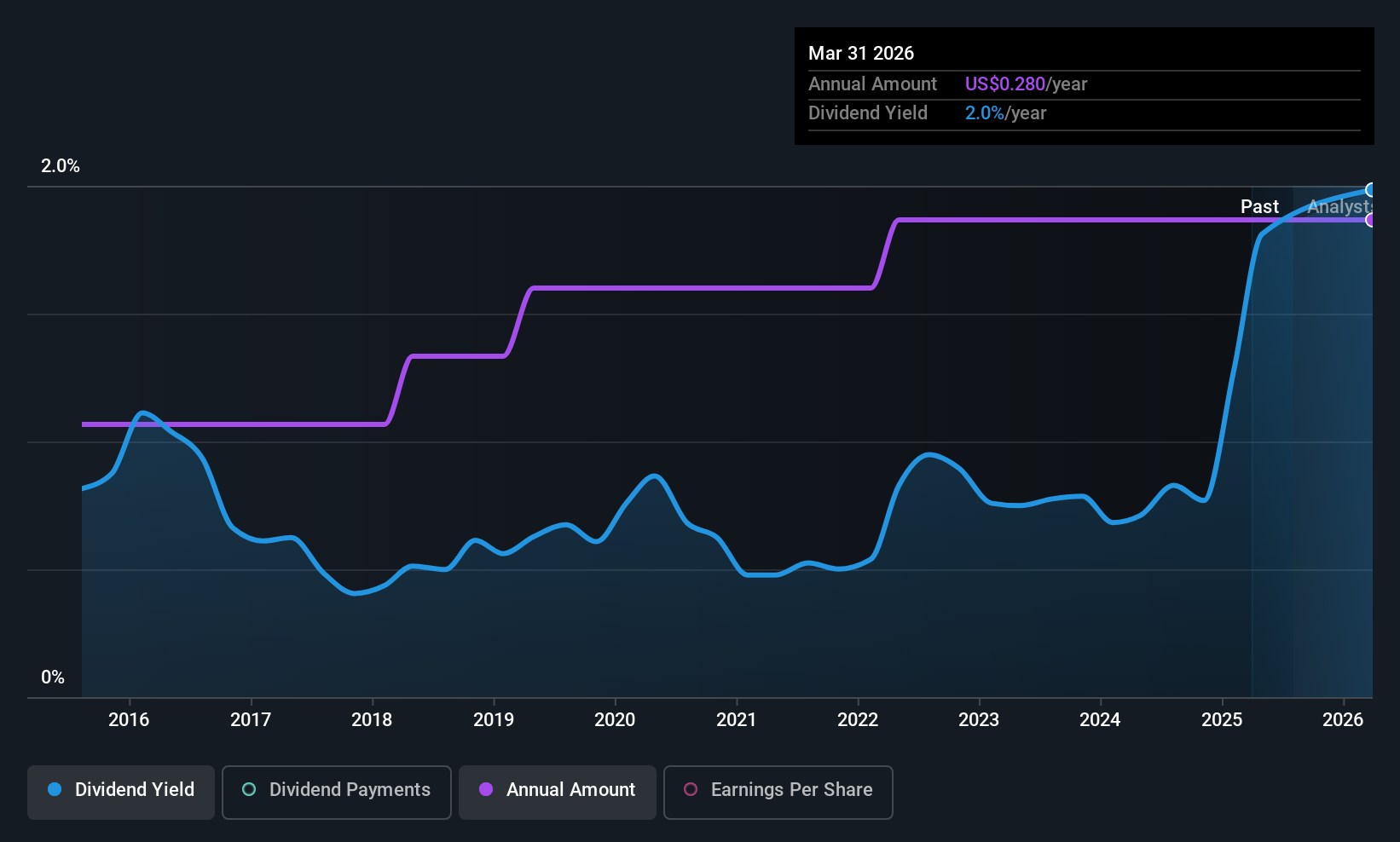
Columbus McKinnon Corporation (NASDAQ:CMCO) is about to trade ex-dividend in the next 3 days. Typically, the ex-dividend date is one business day before the record date, which is the date on which a company determines the shareholders eligible to receive a dividend. The ex-dividend date is of consequence because whenever a stock is bought or sold, the trade takes at least one business day to settle. Meaning, you will need to purchase Columbus McKinnon's shares before the 8th of August to receive the dividend, which will be paid on the 18th of August.
The company's upcoming dividend is US$0.07 a share, following on from the last 12 months, when the company distributed a total of US$0.28 per share to shareholders. Based on the last year's worth of payments, Columbus McKinnon stock has a trailing yield of around 2.0% on the current share price of US$14.11. Dividends are a major contributor to investment returns for long term holders, but only if the dividend continues to be paid. So we need to investigate whether Columbus McKinnon can afford its dividend, and if the dividend could grow.
Dividends are typically paid out of company income, so if a company pays out more than it earned, its dividend is usually at a higher risk of being cut. Columbus McKinnon paid a dividend last year despite being unprofitable. This might be a one-off event, but it's not a sustainable state of affairs in the long run. Given that the company reported a loss last year, we now need to see if it generated enough free cash flow to fund the dividend. If Columbus McKinnon didn't generate enough cash to pay the dividend, then it must have either paid from cash in the bank or by borrowing money, neither of which is sustainable in the long term. Fortunately, it paid out only 44% of its free cash flow in the past year.
See our latest analysis for Columbus McKinnon
Click here to see the company's payout ratio, plus analyst estimates of its future dividends.

Have Earnings And Dividends Been Growing?
When earnings decline, dividend companies become much harder to analyse and own safely. If earnings decline and the company is forced to cut its dividend, investors could watch the value of their investment go up in smoke. Columbus McKinnon was unprofitable last year and, unfortunately, the general trend suggests its earnings have been in decline over the last five years, making us wonder if the dividend is sustainable at all.
The main way most investors will assess a company's dividend prospects is by checking the historical rate of dividend growth. Columbus McKinnon has delivered an average of 5.8% per year annual increase in its dividend, based on the past 10 years of dividend payments.
We update our analysis on Columbus McKinnon every 24 hours, so you can always get the latest insights on its financial health, here.
To Sum It Up
Should investors buy Columbus McKinnon for the upcoming dividend? First, it's not great to see the company paying a dividend despite being loss-making over the last year. On the plus side, the dividend was covered by free cash flow." It's not an attractive combination from a dividend perspective, and we're inclined to pass on this one for the time being.
Although, if you're still interested in Columbus McKinnon and want to know more, you'll find it very useful to know what risks this stock faces. For example, Columbus McKinnon has 2 warning signs (and 1 which makes us a bit uncomfortable) we think you should know about.
If you're in the market for strong dividend payers, we recommend checking our selection of top dividend stocks.
Have feedback on this article? Concerned about the content? Get in touch with us directly. Alternatively, email editorial-team (at) simplywallst.com.
This article by Simply Wall St is general in nature. We provide commentary based on historical data and analyst forecasts only using an unbiased methodology and our articles are not intended to be financial advice. It does not constitute a recommendation to buy or sell any stock, and does not take account of your objectives, or your financial situation. We aim to bring you long-term focused analysis driven by fundamental data. Note that our analysis may not factor in the latest price-sensitive company announcements or qualitative material. Simply Wall St has no position in any stocks mentioned.